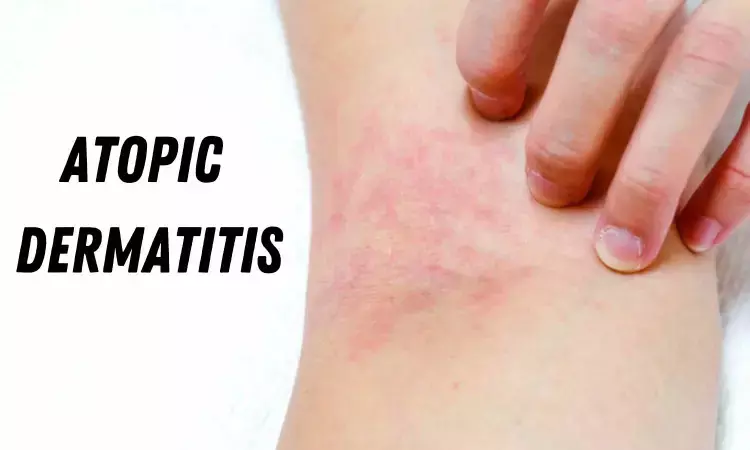- Home
- Medical news & Guidelines
- Anesthesiology
- Cardiology and CTVS
- Critical Care
- Dentistry
- Dermatology
- Diabetes and Endocrinology
- ENT
- Gastroenterology
- Medicine
- Nephrology
- Neurology
- Obstretics-Gynaecology
- Oncology
- Ophthalmology
- Orthopaedics
- Pediatrics-Neonatology
- Psychiatry
- Pulmonology
- Radiology
- Surgery
- Urology
- Laboratory Medicine
- Diet
- Nursing
- Paramedical
- Physiotherapy
- Health news
- Fact Check
- Bone Health Fact Check
- Brain Health Fact Check
- Cancer Related Fact Check
- Child Care Fact Check
- Dental and oral health fact check
- Diabetes and metabolic health fact check
- Diet and Nutrition Fact Check
- Eye and ENT Care Fact Check
- Fitness fact check
- Gut health fact check
- Heart health fact check
- Kidney health fact check
- Medical education fact check
- Men's health fact check
- Respiratory fact check
- Skin and hair care fact check
- Vaccine and Immunization fact check
- Women's health fact check
- AYUSH
- State News
- Andaman and Nicobar Islands
- Andhra Pradesh
- Arunachal Pradesh
- Assam
- Bihar
- Chandigarh
- Chattisgarh
- Dadra and Nagar Haveli
- Daman and Diu
- Delhi
- Goa
- Gujarat
- Haryana
- Himachal Pradesh
- Jammu & Kashmir
- Jharkhand
- Karnataka
- Kerala
- Ladakh
- Lakshadweep
- Madhya Pradesh
- Maharashtra
- Manipur
- Meghalaya
- Mizoram
- Nagaland
- Odisha
- Puducherry
- Punjab
- Rajasthan
- Sikkim
- Tamil Nadu
- Telangana
- Tripura
- Uttar Pradesh
- Uttrakhand
- West Bengal
- Medical Education
- Industry
Long-term treatment with abrocitinib safe and effective for patients with moderate-to-severe atopic dermatitis

Germany: Findings from the long-term extension JADE EXTEND study supported Abrocitinib as an effective treatment for patients with moderate-to-severe atopic dermatitis (AD).
The study, published in the Journal of the European Academy of Dermatology and Venereology, reported that 25-week long-term abrocitinib treatment led to clinically meaningful skin and pruritus improvement. Also, the researchers found the long-term safety profile of abrocitinib to be manageable and consistent with previous reports.
"The long-term abrocitinib treatment resulted in significant improvement in Eczema Area and Severity Index (EASI) score, Numerical Rating Scale (NRS) itch and severity, specifically in patients who previously failed on baricitinib and/or upadacitinib," Kristian Reich, University Medical Center Hamburg-Eppendorf, Hamburg, Germany, and colleagues reported.
In phase 3 studies, abrocitinib improved signs and symptoms of moderate-to-severe AD at 12 to 16 weeks with a manageable safety profile. There is a need for further understanding of the long-term efficacy and safety profile of abrocitinib for its appropriate use in chronic AD treatment.
Dr Reich and the team aimed to evaluate the efficacy of abrocitinib for up to 48 weeks and long-term safety in patients with moderate-to-severe atopic dermatitis.
JADE EXTEND is an ongoing, phase 3, long-term extension study that enrolled patients from previous abrocitinib AD trials. The analysis by Reich and team focused on patients from the phase 3 JADE MONO-1, JADE MONO-2, and JADE COMPARE studies who completed the full treatment period of placebo or abrocitinib (once daily 200 mg or 100 mg) and subsequently entered JADE EXTEND.
Efficacy endpoints were the proportion of patients that achieved skin clearance (≥75% improvement in Eczema Area and Severity Index; (Investigator's Global Assessment [IGA] 0/1 [clear/almost clear]; and itch response (Peak Pruritus Numerical Rating Scale [PP-NRS] severity ≥4-point improvement). Safety endpoints were treatment-emergent adverse events (TEAEs), TEAEs leading to discontinuation and serious TEAEs.
The authors reported the following findings:
- As of the data cut-off, ~70% and ~45% of patients received abrocitinib for ≥36 and ≥48 weeks, respectively.
- Nasopharyngitis, atopic dermatitis, nausea and upper respiratory tract infections were the most frequent TEAEs.
- Serious TEAEs occurred in 7% and 5%, and TEAEs leading to study discontinuation occurred in 9% and 7% of patients receiving abrocitinib 200 mg and 100 mg, respectively.
- Week 48 efficacy responses with abrocitinib 200 mg and 100 mg were as follows: IGA 0/1 52% and 39%; EASI-75 82% and 67%, and PP-NRS severity ≥4-point improvement 68% and 51%.
"These data support the abrocitinib's efficacy as a long-term treatment for adults and adolescents with moderate-to-severe atopic dermatitis, either as monotherapy or with concomitant medicated topical therapy, and provide further supportive long-term evidence for the abrocitinib's manageable safety profile," the researchers concluded.
Reference:
Reich, K., Silverberg, J. I., Papp, K. A., Deleuran, M., Katoh, N., Strober, B., Beck, L. A., Werfel, T., Zhang, F., Biswas, P., DiBonaventura, M. D., Chan, G., Johnson, S., Farooqui, S. A., Kerkmann, U., & Clibborn, C. Abrocitinib efficacy and safety in patients with moderate-to-severe atopic dermatitis: Results from phase 3 studies, including the long-term extension JADE EXTEND study. Journal of the European Academy of Dermatology and Venereology. https://doi.org/10.1111/jdv.19280
Dr Kamal Kant Kohli-MBBS, DTCD- a chest specialist with more than 30 years of practice and a flair for writing clinical articles, Dr Kamal Kant Kohli joined Medical Dialogues as a Chief Editor of Medical News. Besides writing articles, as an editor, he proofreads and verifies all the medical content published on Medical Dialogues including those coming from journals, studies,medical conferences,guidelines etc. Email: drkohli@medicaldialogues.in. Contact no. 011-43720751


